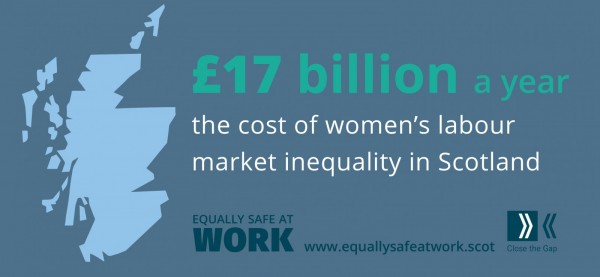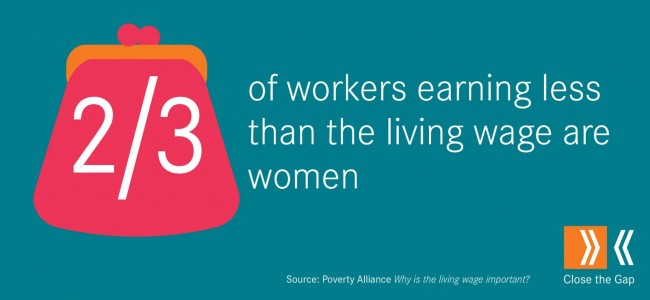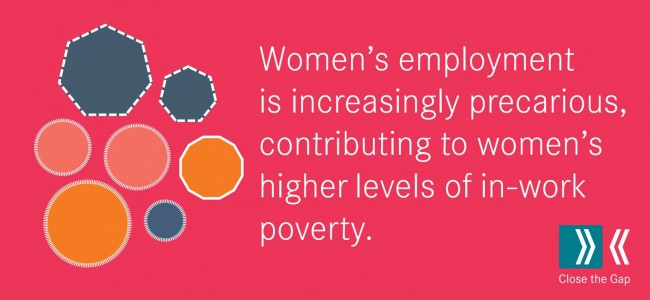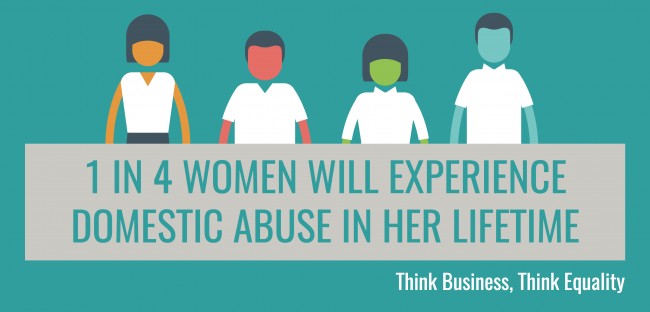Blog
New legislation puts gender equality at the heart of the Scottish National Investment Bank
Facilitating changes in policy can be a slow process, and it’s often very difficult to measure your impact and success. So, when your advocacy has a clear and tangible impact, we don’t think it should pass without note!
Over the past few months, Close the Gap has been working closely with Engender to promote the importance of building gender equality into the design of the Scottish National Investment Bank (SNIB).
Traditionally, economic development agencies have not incorporated women’s specific needs and have not prioritised women’s equality. Consequently, the gender pay gap remains at 13%, and if numbers of women-led businesses in Scotland increased to equal those of men, it would lead to a 5% increase in GDP, equivalent to £7.6bn. We thought the SNIB was a chance to do things differently.
Earlier this week, the legislation to create the Bank was passed by the Scottish Parliament. Importantly, and very excitingly, Close the Gap and Engender’s six key asks are contained within that piece of legislation. We achieved:
- An additional ancillary object relating to equality and non-discrimination;
- The Bank’s vision statement, which had been articulated in the Implementation Plan, is now on the face of the Bill thus giving permanency to the more ambitious and transformational aspects of the Bank;
- The mission setting process has been refined, meaning that Ministers will have to consider how missions will further equality;
- The Bank is required to publish and review a gender equality strategy;
- The Bank must gather intersectional gender disaggregated data on its investments, programmes and services, and report on its progress against the Gender Equality Strategy; and
- The Bank is required to carry out a regular equal pay review.
That the Bill was changed to include all of these amendments is a big success and will have positive impact on women’s experiences of working within the Bank, the Bank’s gender pay gap, and women’s wider social and economic equality in Scotland.
That the Bank will be required to carry out a regular equal pay review is a really positive development for the financial services as a whole, a sector that has been characterised by unequal pay and large gender pay gaps. Close the Gap research into employer reactions to the pay gap uncovered employer complacency, with less than a third undertaking an equal pay review or having any plans to do one in the future. The Bank will not be able to be complacent about potential discrimination in its pay systems.
How did we get to this point?
Our work on the Bank started in November 2017, when Close the Gap joined together with Engender, the Scottish Women’s Budget Group and Women’s Enterprise Scotland to produce seven principles for a gender-competent Scottish National Investment Bank.
This has been a multi-pronged approach to advocacy that’s seen us write numerous briefings, respond to three formal Government consultations, meet opposition MSPs, Cabinet Secretaries, and work with the Bill team. We had the support of Jackie Baillie MSP, who lodged our amendments and spoke eloquently about the need for gender equality to be at the heart of the Bill in committee sessions and in the chamber.
Before the Bill was even introduced, in line with the recommendation contained within Scotland’s gender pay gap action plan, A Fairer Scotland for Women, we were working with Government officials on the equality impact assessment. At stage one, we provided briefings to MSPs which outlined our ambitions for the Bill. We also tried to build alliances across the third sector, working with SCVO and Social Enterprise Scotland to give a stronger voice to our gender equality messages.
At stage two, Jackie Baillie brought amendments to Bill at the Economy, Energy and Fair Work Committee. We made some good progress against our objectives at this stage with changes to the mission setting process agreed, the vision being added to the Bill along with an equality and non-discrimination objective, albeit with compromise wording.
Crucially, we also achieved verbal commitments for the Cabinet Secretary to work with us ahead of stage three to discuss the opportunities for further amendments. This meant more briefings and meetings ahead of stage 3, working with various stakeholders to draft robust amendments pertaining to the gender equality strategy and equal pay reviews. This was difficult because there was not a precedent for some of our ambitions in pre-existing UK legislation. For example, lawyers had to establish wording for intersectional data.
On Tuesday, our remaining amendments were agreed in the chamber at stage three. Encouragingly, we were pleased to see that all parties supported integrating women’s equality into SNIB, with three of the amendments passing without a vote.
Accountability on gender equality has been built into the Bank. Along with Parliamentarians, Close the Gap and Engender will continue to scrutinise the work of the Bank, ensuring that they bring forward an ambitious and robust gender equality strategy. The intersectional gender-disaggregated data which will be gathered by the Bank will also provide valuable insight into the experiences of different groups of women in accessing finance and working within financial institutions.
This piece of legislation also opens other doors for us in that it sets an important precedent. In future legislative processes, we can ask ‘if a gender equality strategy works in the context of the SNIB Act, why not here?’. If the Bank can carry out regular equal pay reviews, why can’t the other economic development agencies? With these asks in mind, keep an eye out for our forthcoming Gender Pay Gap manifesto ahead of the 2021 Scottish Parliament election.
Policy change can be slow and long-term, so we were delighted to see the Bill pass this week. Now we are looking forward to working with the Bank to realise the possibilities that have been established with the passing of this legislation.
The detrimental impact domestic abuse has on women’s employment
The 25th of November marks the first day of the 16 Days of Activism for the elimination of violence against women and girls, an international campaign dedicated to raising awareness that violence against women is an enduring social problem.
This year as part of the 16 days of activism, we wanted to share an experience from a victim-survivor of domestic abuse, Kate, to highlight the impact it had on her life and experience at work. As a result of domestic abuse, and despite her employer having a domestic abuse policy in place, Kate was forced to move from a senior, full-time, permanent job to a lower-paid, part-time, temporary role with a different employer. She had to trade her professional status, income, job security, current and future earnings and pension in order to feel safe at work.

Equal Pay Day sharpens the focus on pay discrimination
Recent data from the Office for National Statistics revealed that Scotland’s gender pay gap had narrowed ever so slightly from 14% to 13%. We aren’t celebrating though because it still represents a lifetime of inequality for working women.
Equal Pay Day is the day from which women are effectively working for free for the rest of the year because of the gender pay gap. Of course it's much earlier in the year for Black and minority ethnic women and disabled women, who experience higher gender pay gaps. Having this day each year brings into focus the stubborn challenge of one of the pay gap's main causes – pay discrimination. Media coverage of recent high profile equal pay claims such as that brought against the BBC by Samira Ahmed, and the hard-fought settlement won by women workers at Glasgow City Council highlights the scale of the challenge. Pay discrimination affects individual women and it’s also a feature of female-dominated jobs and sectors because the economy systemically undervalues the work they do.

Gender pay gap reporting was meant compel employers to take action to address any pay gaps, including looking at the challenge of pay inequality. But as yet there’s little evidence that action is being prioritised. Quite the opposite, in fact. Close the Gap’s assessments of gender pay gap reporting among Scottish employers has found pay becoming increasingly invisible. In 2018, out of 200 employers who’d reported their pay gap, only one mentioned doing an equal pay review and another mentioned plans to look at job evaluation. What was commonly found was a generic statement on employer reports which said: “The gender pay gap is not the same as equal pay which is unlawful. We are confident that we’re providing equal pay for all staff”. It’s difficult to see how so many employers can be so confident since the vast majority have never done an equal pay review, nor have any plans to do one. The gender pay gap is not just about pay but pay is still important, and that message is getting lost.
If you think you're being paid unfairly because you're a woman, there's information on our website about what you can do next.
If you're an employer who wants to check whether you're paying staff fairly, Close the Gap has developed online tools to help you. SMEs can use our Think Business, Think Equality self-assessment tool which has a resource on pay and reward. Large employers can use our Close Your Pay Gap tool which also includes a self-assessment test and lots of free resources.
The Living Wage can loosen the grip of women’s poverty
Living Wage Week is an opportunity to recognise the importance of the living wage in lifting women out of poverty and enabling fair work for women.
Women continue to account for the majority of low-paid workers in Scotland and research from Living Wage Scotland has shown that women in part-time work stand to benefit the most from Living Wage accreditation.
Women’s employment is becoming increasingly precarious with women accounting for two-thirds of workers earning less than the living wage and 55% of workers on zero-hour contracts. The rise in women’s self-employment has also coincided with a rise in low-paid self-employment.

Women’s experience of the labour market is ultimately linked to women’s experience of poverty. In Scotland, women are more likely to be in poverty than men; are more likely to experience in-work poverty; find it harder to escape poverty and are more likely to experience persistent poverty than men. In line with the multiple labour market barriers experienced by different groups of women, the risk of poverty is even greater for black and minority ethnic, disabled and refugee and asylum-seeking women.
The Scottish Government have recognised the inextricable links between gender and poverty, and women’s poverty and child poverty in a number of key policy documents including Scotland's gender pay gap action plan, and the child poverty delivery plan. These plans are clear that tackling the gender pay gap is essential to overcoming women’s higher rates of in-work poverty, and child poverty in Scotland.
It’s vital that the Scottish Government and other policymakers adopt a gendered approach to all labour market policymaking and analysis of low pay in Scotland. At present, this is often not the case with key labour market policies failing to consider women’s different experiences of work, and policy analysis which does not recognise women’s distinct experiences of low-pay and poverty. We also continue to see analysis pertaining to low-paid workers, lone parents and child poverty without any consideration of the gendered causes.
It is also distinctly unsurprising that women make up the majority of workers being paid below the living wage, because women’s preponderance in low-paid work is a major cause of the gender pay gap. The gender pay gap represents a lifetime of inequality for women. Responses to the pay gap often focus on getting more women into senior roles. While vitally important, this ignores the fact that the gender pay gap is also caused by women’s concentration in low-paid, insecure and undervalued work such as care, retail and cleaning.
Work that is seen as “women’s work” is systematically undervalued in the labour market because this work is done by women. Practically, undervaluation means that women will receive lower rewards from investing in education or from their own work experience, and undervaluation thus underpins both occupational segregation and the pay divergence that accompanies it. While the payment of the living wage in these jobs and sectors is an important start, ultimately this has to be accompanied by a more structural response to the continued economic undervaluation of work done by women.
Women are more likely than men to have caring responsibilities and therefore must find work that allows them to balance earning with caring. This sees women concentrated in part-time work. However, most part-time work is found in the lowest paid jobs and part-time jobs are more than three times as likely to pay below the living wage than full-time roles.

Lone parents, 91% of whom are women, may be juggling several low-paid jobs at the same time to earn enough to make ends meet. Almost half (48%) of single-parent households are living in poverty, compared to a quarter (24%) of couple households.
The payment of the Living Wage in female-dominated sectors such as care, catering and retail is an important mechanism to lift women and their families out of poverty. Every Child, Every Chance has a focus on engaging with particular sectors such as tourism and hospitality where women’s low pay is a concern. The Plan outlines how these sectors, as key growth sectors of the Scottish economy, needs to play its full role in ending child poverty.
We also need a step change in employer responses to part-time and flexible working. Too often, there’s a cultural presumption against part-time working in senior grades, and in male-dominated jobs and sectors. This prevents women from progressing, and sustains their concentration in the lowest paid jobs in the labour market. Presently, only 12% of jobs paying £20,000 or more a year are advertised on a flexible basis, and research by Close the Gap has shown that the right to request regulations, extended to all employees in 2014, have not resulted in the normalisation of flexible working, as was envisaged.
Employers that pay their staff the real Living Wage, and enable them to work flexibly at all levels, will be able to benefit from the well-evidenced gains of gender equality at work. This will also enable us to challenge women’s poverty, meet Scotland’s targets on child poverty and make real progress towards closing the gender pay gap in Scotland.
While women continue to represent the majority of workers being paid below the living wage, we will be unable to realise the ambition of enabling access to fair work for women in Scotland.
Close the Gap launches innovative new resource for businesses on domestic abuse

Close the Gap is delighted to launch a new resource for businesses on domestic abuse as part of Think Business, Think Equality, the online self-assessment tool designed specifically for SMEs.
The free online tool enables employers to self-assess their employment practice and provides tailored advice and an action plan which sets out the simple steps you can take so that your business can realise the benefits of gender equality and diversity. The new resource on domestic abuse also includes a range of free resources for download including:
- Guidance on domestic abuse and employment
- FAQ on domestic abuse and work
- Good practice examples
- Workplace resources
- Useful links including signposting to specialist support organisations
Think Business, Think Equality already includes six resources on key aspects of employment practice including flexible working, workplace culture, pay and reward, progression and promotion, pregnancy and maternity and job segregation.
The new test, which takes no longer than five minutes to complete, has been developed to enable businesses to effectively support employees experiencing domestic abuse. Domestic abuse not only affects the victim-survivor but can also impact colleagues, and ultimately the smooth running of a business through increased absenteeism, reduced productivity and higher turnover. Domestic abuse is estimated to cost the UK economy £66 billion a year, which includes the cost to businesses in lower productivity, administrative difficulties from unplanned time off, lost wages and sick pay.
1 in 4 women experience domestic abuse in their lifetime in Scotland, so it makes good business sense to think about domestic abuse. As an employer, there are a range of simple, practical steps that you can take to ensure you effectively support your people, and protect your business.
The majority of women affected by domestic abuse are targeted at work. Perpetrators of domestic abuse often use workplace resources such as phones and email to threaten, harass or abuse their current or former partner. Perpetrator tactics such as sabotage, stalking and harassment at work, affect women’s ability to do their job, and to sustain employment.
Businesses that take steps to supports employees will benefit in a range of ways. Ensuring the safety and wellbeing of key people at work means that you're more likely to retain the skills and experience of female talent. By recognising the potential impact of domestic abuse on employees and their colleagues, you're minimising the risk to your business.
Delivering workplace equality makes good business sense. Having fair and flexible working practices allows you to attract and retain the best talent, reduce recruitment and training costs, and it makes your business more productive, more innovative, and more profitable. Evidence shows that gender equality at work is not just good for women, but is also a critical driver for improved business performance, and a worldwide catalyst for economic growth. Crucially closing the gender gap in employment is worth up to £17 billion to the Scottish economy.
Find out how your business can benefit from gender equality and diversity. Take the Think Business, Think Equality test on domestic abuse at www.thinkbusinessthinkequality.org.uk.
Want to know more about business benefits of gender equality? Watch one of our 30 second films.
If you’re on the move, you can download the Think Business, Think Equality app for iOS, Android or Windows.
